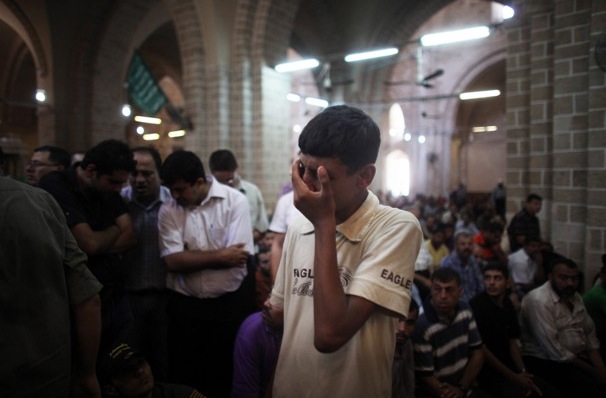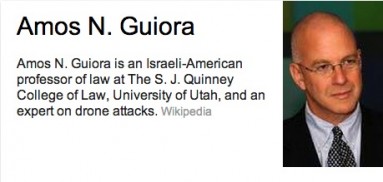The University of Chicago's Center for International Studies has scheduled an upcoming talk by University of Utah law professor Amos Guiora titled 'Legitimate Target: A Criteria Based Approach to Targeted Killing.'
Billed as an oration on the criteria of targeted killing, Guiora highlights the 'moral' frou-frou of state assassination:
Targeted killings represent both the contemporary weapon of choice and, and likely, the weapon of the future. From the perspective of the nation-state, the benefits of targeted killing are clear: aggressive measures against identified targets can be carried out with minimal, if any, risk to soldiers. But while the threat to soldiers is minimal, there are other risks that must be considered. Particularly, there is a high possibility of collateral damage as well as legitimate concerns regarding how a target is defined. Clearly broad legal, moral, and operational issues are at stake when considering targeted killing.
Amos Guiora will discuss why targeted killing decisions must reflect consideration of four distinct elements: law, policy, morality, and operational details, thus ensuring that it complies with principles of domestic and international laws. Based on personal experience and an academic perspective, Guiora will offer important criticism and insight into the policy as presently implemented, highlighting the need for a criteria based decision making process in defining and identifying a legitimate target. [emphasis added]
The word 'drone' never appears anywhere on the event announcement even though Guiora, a 19-year veteran of the Israel Defense Forces as lieutenant colonel, military law school commander, and legal adviser on Gaza, is 'an expert on drone attacks.'
Neither will Guiora ever mention that Israel Aerospace Industries, what the Washington Post called the 'cradle of the modern drone,' operates 30 miles north of Gaza.
Guiora has kept busy since Israel unleashed on Operation Pillar of Cloud on Gaza in November 2012, striking at least 1,500 sites in Gaza, killing upwards of 158 Palestinians, and injuring at least 1,000. During that onslaught, Deputy Foreign Minister Danny Ayalon pointed out that 'most of the people that were hit in Gaza deserved it.' Chemical weapons are believed to have been used in the attack as they were during Operation Cast Lead; further, Reporters Without Borders called Israeli attacks on journalists in Gaza 'deliberate.' As recently as February 2013 a child survivor of 2009's Operation Cast Lead, in which 21 members of the al-Samouni family were killed in a single airstrike, was denied medical treatment by Israel.
Guiora has a distinguished career as a spokesman for Brand Israel in higher education. In a November 2012 talk at Western University (oo:14:09) Guiora cracked sarcastic jokes about the alleged Israeli bombing of the Yarmouk factory in Sudan (last checked, a sovereign country).
A bomb-making factory in Sudan went up in smoke and that's a good thing, whoever did it, good for them. I assume it wasn't the government of Canada.'
Israeli media has reported that the Israeli air force carried out at least two secret operations in Sudan in January and February 2009. The first involved the bombing of a convoy carrying arms through Sudan to Gaza, in which 119 people were killed. And a ship at a Sudanese port was bombed from the air. Sudan accused the US of carrying out these attacks. In June that year Binyamin Netanyahu, Israel's prime minister, told US officials there was 'a steady flow of Iranian weapons to Gaza through Sudan or Syria and then by sea.'
In December 2012, Guiora gave an interview on 'cyber terrorism' to the Wharton School of the University of Pennsylvania, completely devoid of any reference to the obvious.
Interviewer: If a cyberattack were to happen, where might it come from and who might the attackers be?
Guiora: First of all those who are engaged in cyber terrorism are seriously are seriously smart, sophisticated people.
The greatest moment in Guiora's Greatest Hits PR blitz came in February 2013, when he claimed that the U.S. could be doing a much better job of extra-judicial killing, if only it followed Israel's model.
In Israel because of the High Court of Justice, which is a branch of the Supreme Court, there is very engaged and robust judicial review of the executive decision-making process. That’s in direct contrast to here in the United States, where frankly there really is, in context of something like the drone policy there is no robust judicial review.
Guiora's call for judicial oversight citing the Israeli example is rich given the Court's ignominious history. In 1987, for example, the Israeli judicial system had the distinction of becoming the first state in the world to officially and publicly 'legalize' torture by 'endorsing the use of "moderate physical pressure" in the interrogation of Palestinians as a “necessary” and thus legitimate means of combating “hostile terrorist activity”' (see 'On Torture,' report produced by Adalah, Physicians for Human Rights, and Al Mezan Center for Human Rights).
Beyond Michael Oren, who is at the very least an official ambassador to Israel, Guiora will remind observers of Gabriella Blum, another former IDF legal adviser/booster club member (now tenured at Harvard Law School). Her 'Invisible Threats' essay for Stanford's Hoover Institution, featuring an 'drone assassin spider' is not to be missed.
But to those who do wish to conceal their involvement, microrobots, like cyber attacks, offer invisibility. Being near-impossible to regulate, monitor, or detect, they empower perpetrators not only to strike with impunity, but in some cases, to cover up the very occurrence of the attack. Absent the ability to attribute an attack to its source, human violence becomes no different from natural disasters—a harmful event for which the only effective remedy is preparedness, recovery, and prayer.
In nearly 20 pages of writing Blum mentions 'Israel' exactly once, commenting dryly that the assassination of Mahmoud al-Mabhouh in Dubai was 'caught on tape almost from beginning to end, probably affecting the planning and execution of future operations of this sort.' In the 'fight against terror' by the Most Moral Army in the World, the un/official legal and academic enforcer's of the the Israeli army's 'ethical code' are indispensable salespeople.
Meanwhile on the western homefront, President Obama continues to recycle the 'most transparent administration in history' line, this time in a 'fireside hangout' hosted by Google: '[W]hat I tried to do coming into the office was to create a legal and policy framework that respected our traditions and rule of law.' Previously I pointed out the managed technophilia characteristic of his administration, such as virtual chats on drone policy, and 'showing off this with-it-ness in the middle of the most shrouded and large-scale assassination racket in memory' (the first time the President acknowledged the use of U.S. drones in Afghanistan was in a 2012 Google+ Hangout).
At a February 2013 White House press briefing, Press Secretary Jay Carney was asked repeatedly about judicial review in so-called targeted assassination.
Question: I mean, you're taking away a U.S. citizen's due process. And nobody is questioning particularly this President's good intentions, but you're establishing a precedent which will last beyond this administration. You're pointing to various legal decisions to back it up, but doesn’t it deserve a broader debate and a broader court hearing?
Mr. Carney: Well, I don’t know about a specific suggestion like that. I can tell you that the administration has—and I think this is demonstrated by the public comments of senior administration officials on this matter—reviewed these issues—I think that’s demonstrated by the so-called white paper that was published today—and is continually reviewing these matters. How that process moves forward from here I'm not going to speculate.
This blanket non-answer is what Guiora pointed to when he questioned the 'extremely broad definition by the Administration through the DOJ memo.' The accompanying question, however, is whether moral arbitration about state assassination is Israel's to give.

